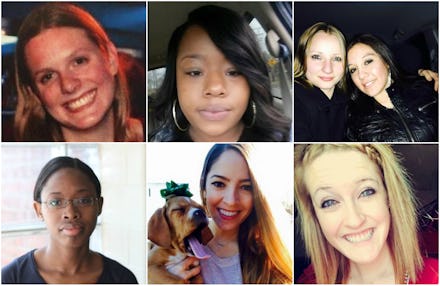These 14 Women Were Brutally Attacked for Rejecting Men — Why Aren't We Talking About It?

It was "easy" for Christopher O'Kroley to kill Caroline Nosal, his coworker at a Madison, Wisconsin, grocery store and the object of his unrequited affection. He said so himself earlier this month, when he was arrested for fatally shooting Nosal because she rejected his romantic advances. He reportedly "wanted more" from their relationship and she turned him down.
So he killed her.
Doing so was easy not just because O'Kroley was able to get a gun quickly and legally and learn how to use it, but also because this happens all the time. Murdering the woman who rejected him was as easy for O'Kroley as it is for the other men who refuse to be refused — men who would sooner take a life than take no for an answer.
In fact, in the first two months of 2016 alone, Nosal and another woman, Janese Talton-Jackson, were murdered in the United States by men whose advances they declined. Both victims are part of a longer list of women — 14, to be exact — who were attacked by men they turned down in the U.S. in the past year.
It's difficult to determine precisely how many women have been attacked on the basis of rejection; in fact, the list Mic has compiled, which consists of cases that occurred between Jan. 1, 2015 and Feb. 15, 2016 and were reported by media outlets, is likely far from comprehensive.
First, there's the issue of crime (under)reporting: Many instances of gender-based violence in particular are not reported, so we know we're not seeing the whole picture. Furthermore, we also don't track assaults and murders according to motive.
According to Jennifer McCleary-Sills, director of gender violence and rights at the International Center for Research on Women, it speaks volumes that the blog When Women Refuse, which has chronicled a number of such instances, currently serves as one of the most comprehensive data sets we have for this type of violence.
"That we don't yet have a standardized format for tracking this particular form of violence against women is very telling," McCleary-Sills told Mic. "We don't have very good formats for tracking violence against women in general. We do know at least one in four women in the U.S. will experience domestic violence, but that's ... one sliver of the type of violence [women] experience."
There's increasing awareness of such gender-based violence in the media. When Elliot Rodger committed a hate-fueled and deadly attack in 2014 in Isla Vista, California, it kickstarted a dialogue about the fact that all women face threats to their physical safety if they dare reject a man's advances; people said violence shouldn't be the price of saying no. Later that year, a New York City woman had her throat slashed for rejecting an unknown man's advances; three days later, Mary "Unique" Spears was shot and killed for turning down a man she didn't know.
The threat of violence manifests itself in various ways in women's lives. Retribution for rejection is a common enough threat, McCleary-Sills noted, that many women automatically respond to men's advances with anxiety or fear.
"As women, we get used to the idea that we have to prepare ourselves, that we have to respond 'appropriately' to men's advances," McCleary-Sills said. "A man calls out on the street, and you decide: Do you want to ignore him and risk hearing what he says, or give a half-hearted smile and hope it's enough?"
But weighing different bad options or feeling like you might not be safe "because some guy is leering at you across the train platform — these things don't get captured in surveys or crime reporting," she added.
When women are shot in the chest outside bars or have their necks slashed by men they don't know — men who just wanted to tell them they looked nice or buy them a drink or take them out sometime — the media does occasionally takes notice, which opens up a dialogue about the misogynist motivation for these crimes.
Sometimes it teaches lessons about why catcalling isn't a compliment; why wanting women's affection doesn't make men entitled to it; why killing a stranger who says no is part of a long continuum of gender-based violence. All of the lessons are the same, but the list of women attacked for saying no is still one we expect to grow longer. We've become "inoculated," as McCleary-Sills put it, to the misogynistic expectations at the root of such violence, which is precisely what keeps women at risk.
"We expect this as part of our daily lives," McCleary-Sills said, "and then we see extreme examples of men refusing to be refused."